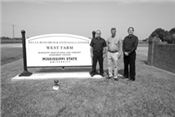|
Agricultural Water Research Center Opens, Grower Participation Needed

Martin Locke, left, director of the Agricultural Research Service National Sedimentation Laboratory; Jeff Johnson, head of the Mississippi State University Delta Research and Extension Center; and Greg Bohach, vice president for the MSU Division of Agriculture, Forestry and Veterinary Medicine, stand at the site of the newly created agricultural water research center in Stoneville, Mississippi.
Photo by MSU Extension Service/Kevin Hudson
DR. JASON KRUTZ AND DAN ROACH
MISSISSIPPI STATE, MISS.
A new research center in the Mississippi Delta is tasked with studying agricultural water management to protect this critical natural resource. The center primarily focus will be on water management in Mississippi, Louisiana, Arkansas and Missouri region. Plans for establishing the facility began in 2014 after several meetings with researchers, regional farmers and stakeholders to discuss water-related research in the Lower Mississippi River region. The center is a cooperative venture between the Mississippi Agricultural and Forestry Experiment Station and the U.S. Department of Agriculture Agricultural Research Service, the center will be located at the MAFES West Farm. One of the goals of the center is to expand the scope of the present day RISER program within Mississippi and throughout the region.
The Row-Crop Irrigation Science and Extension Research (RISER) was developed as a science based approach to evaluating irrigation Best Management Practices (BMPs) here in the Delta. The RISER program is designed to assist producers in reducing water use while maintaining yield and profitability. Growers participating in the RISER program agree to allow the MSU researcher to manage the irrigation decisions on one field while the producer manages the control.
Since 2013, the RISER program encompassed over sixty producer fields covering all major soil types here in the Delta. While maintaining yield, the Riser program participants reduced their water use by 25 percent over the controls. These results demostrate the potential for computerized hole selection (PHAUCET or Pipe Planner), surge irrigation,and soil moisture sensors to improve water use efficiency and producer profitability.
With observations from twenty locations, the RISER soybean trials yields were equivalent to the fields managed by the producer. Water use was reduced by 21 percent and water use efficiency improved by 36 percent. Producer profitability was increased by $13 per acre.
Similarly, the RISER corn trials consisted of sixteen locations. Results from RISER corn trials demonstrate the utility of irrigation timing tools such as moisture sensors. Utilizing moisture sensors to trigger irrigation allowed the MSU researcher to reduce water use by 3.9 acre inches, a 41 percent reduction in comparison to the producer. Corn yields were increased by 7 bushels and overall profitability was increased by $27 per acre.
Mark Henry, Extension Research, is requesting growers interested in taking a look at the benefits of the RISER program on their farm contact him at 662 820 6093. ∆
DR. JASON KRUTZ, Irrigation Specialist and DAN ROACH, Ext. Associate, Mississippi State
|
|